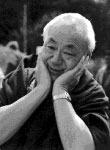Lama Gendun Rinpoche was a Tibetan monk born in 1918, respected for his embodiment of kindness, compassion and simplicity. About his life he said: “I don’t have a life story, I’ve drunk tea and eaten tsampa”.
Below is one of his famous poems.
through great effort and willpower,
but is already present, in open relaxation and letting go.
Don’t strain yourself,
there is nothing to do or undo.
Whatever momentarily arises in the body-mind
has no real importance at all, has little reality whatsoever.
Why identify with, and become attached to it,
passing judgment upon it and ourselves?
Far better to simply
let the entire game happen on its own,
springing up and falling back like waves–
without changing or manipulating anything–
and notice how everything vanishes and
reappears, magically, again and again,
time without end.
Only our searching for happiness
prevents us from seeing it.
It’s like a vivid rainbow which you pursue without ever
catching,
or a dog chasing its own tail.
Although peace and happiness do not exist
as an actual thing or place,
it is always available
and accompanies you every instant.
Don’t believe in the reality
of good and bad experiences;
they are like today’s ephemeral weather,
like rainbows in the sky.
Wanting to grasp the ungraspable,
you exhaust yourself in vain.
As soon as you open and relax this tight fist of grasping,
infinite space is there–open, inviting and comfortable.
Make use of the spaciousness, this freedom and natural ease.
Don’t search any further.
Don’t go into the tangled jungle
looking for the great awakened elephant,
who is already resting quietly at home
in front of your own hearth.
Nothing to do or undo,
nothing to force,
nothing to want,
and nothing missing—-
Emaho! Marvelous!
Everything happens by itself.
Lama Gendun Rinpoche





